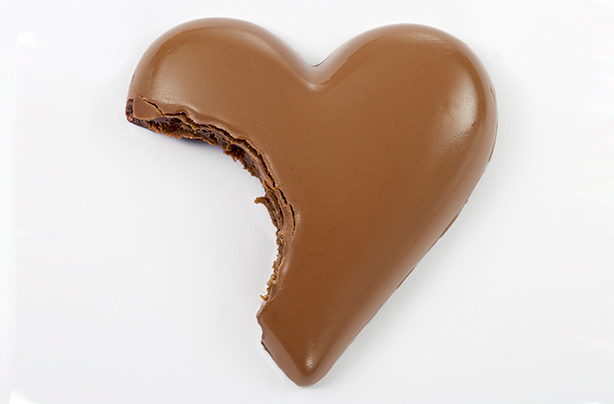Emotional eating - does this sound like you?
Find yourself munching more when you're stressed? Upset? Lonely? Find out what kind of emotional eater you are (and how to stop for good)

If you're stressed and munching your way through a packet of biscuits we're not surprised. Research shows in any given year 65% of people start a diet, yet around 95% of these fail.
In over 90% of cases the reasons for falling off the diet-wagon are emotional issues and niggles. Any stress, upset, hurt feelings or unexpressed anger a dieter hasn't faced or sorted out sends them seeking comfort in food.
Such emotional eating only causes more upset. The emotional eaters Dr Pam Spurr interviewed for her new book said they're plagued with questions like 'Why did I eat those extra helpings?'
'Why did I allow myself those treats I didn't need?'
Considering these alarming diet stats, plus the damage emotional eating does to self-esteem, it's crucial you understand it. But how do you know if you're an emotional eater? Check the following statements - and typical scenarios related to them - and be honest if any describe you.
The Emotional Eater Checklist:
1. When stressed you turn to snacks or comfort foods.
Classic Scenarios: Your boss moves up a deadline, you're running late, you can't decide what to wear, you've been hanging on a customer service line for ages when you've tons to do. Your body and mind are fizzing with stress hormones.
GoodtoKnow Newsletter
Parenting advice, hot topics, best buys and family finance tips delivered straight to your inbox.
2. When your feelings are hurt or you feel unable to express things like anger, you calm yourself with foods.
Classic Scenarios: You're hurt when left out by friends, you're annoyed with the way a family member treats you, you're overlooked at work. You feel awful inside about these sorts of things.
3. You feel neglected or taken for granted and turn to snacking at such times.
Classic Scenarios: That new man or your long-standing partner doesn't get in touch when supposed to, a colleague/boss piles work on you, you do favours for people without thanks. You're left feeling not good enough.
4. You figure no-one's bothered about you so you're not bothered if you put on weight and carry on snacking when not hungry.
Classic Scenarios: You've moved jobs/house and no-one's asked how you're coping, people forget your birthday, no-one asked you to join the workplace drinks. It feels like no-one cares. 5. You really want attention or affection but reach for comfort food instead.
Classic Scenarios: You don't feel you get enough attention from your partner/mum/friends or you'd love people at work to notice your efforts. All you want is some love and reassurance.
6. You feel lonely but don't want to 'trouble anyone' so you use food for solace.
Classic Scenarios: You can't afford to go out with friends and stay home alone, in your relationship you feel lonely and disconnected, or everyone else seems to be having a great social life. Loneliness creeps up very quickly.
7. After turning to comfort food and emotional eating you feel worse about yourself.
Classic Scenarios: You've allowed yourself that second helping, or you've bought extra treats. You feel worse but it's hard to stop eating when you want comfort.
8. You keep a 'stash' of snack foods so that you don't feel anxious that there won't be something to turn to.
Classic Scenarios: You have a stash drawer at work or at home, or you always have treats in your handbag.
Any of these sound like you? If so, you may well be an emotional eater.
Do you feel worse about yourself after turning to food for comfort? It could be a sign of emotional eating.
Dr Pam's top tips to tame your Emotional Eating
It can feel almost impossible to think about starting to control the feelings associated with emotional eating at times, but it can be done - from 'appetite control' techniques to building your confidence and self-esteem.
1. Begin to 'own' your emotions - don't feel bad about feeling bad! Your emotions serve a purpose, flagging up that something needs changing.
2. Learn to speak up about the way you feel. You'll soon find talking about things that upset or hurt you takes some sting out of them.
3. Use the '3 Ps' to do this. PLAN what to say. PRACTICE what you decide to say so you feel confident saying it to the person. PUT it into action at an optimal time when neither of you are stressed.
4. Know your emotional 'triggers' - the people, situations or things that send you running for comfort food. Prevention's better than cure so plan ahead how you can handle your triggers.
5. Have a crisis plan. When you're about to tuck into chocolate/chips ring that person who always lifts you.
6. Beware of the 'disease to please'. Lots of emotional eaters feel they should bend over backwards to please others. Your happiness and well-being is just as important.
7. Devise your own motto to repeat in difficult times, for example: 'Food can only meet my energy needs, it can never meet my emotional needs - I need to sort this situation out.'
By Dr Pam Spurr, self-help expert and author of the new guide The Emotional Eater's Diet